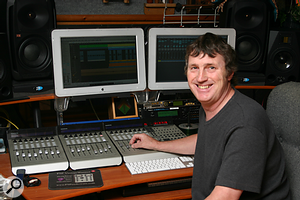I had planned to write a Leader on an entirely different and arguably less contentious subject this month, but after seeing the response to last month's offering, I couldn't resist continuing the theme, especially after one reader suggested that I had, in effect, lit the blue touch paper and stood well back! Predictably, there were missives from keyboard players who opposed my viewpoint that the guitar is a far more expressive instrument, so I feel I should explain some of my reasoning.
 Nobody would argue that a well-played, well-composed piano piece can convey a lot of musical emotion, but I still stand by my statement that keyboard players have very limited means of injecting expression into the notes that are played. In the case of a piano, you can control the intensity, timing and sustain of a note, and you can play a great number of notes at the same time, but with a guitar, you can control the level, the sustain, the timbrality via damping, picking position and partially pinched harmonics, the precise degree of pitch-bend and vibrato, and you can produce a number of non-pitched effects as well as electronically-assisted effects.
Nobody would argue that a well-played, well-composed piano piece can convey a lot of musical emotion, but I still stand by my statement that keyboard players have very limited means of injecting expression into the notes that are played. In the case of a piano, you can control the intensity, timing and sustain of a note, and you can play a great number of notes at the same time, but with a guitar, you can control the level, the sustain, the timbrality via damping, picking position and partially pinched harmonics, the precise degree of pitch-bend and vibrato, and you can produce a number of non-pitched effects as well as electronically-assisted effects.
In fact, it's probably fair to suggest that the more polyphony an instrument offers, the less expressive it tends to be (another great subject for forum debate). A guitar used to play solo lead lines, for example, is far more expressive than one used to play chords, though even with chords you can go way beyond what a keyboard can do. Same with a violin, and solo instruments such as sax and flutes can be enormously expressive, as everything goes into that one note. There's simply no argument — pianos and organs are poor controllers when it comes to putting expression into synthetic sounds that need articulation and subtlety. If you don't believe me, try playing a sax sample from a MIDI piano and then from a MIDI guitar and see which is closest to sounding like the real thing. At the risk of pouring more fuel on the flames, I'd suggest that synths became less expressive and less interesting as soon as they became polyphonic. In their mono guise, they were instruments of wonder, but once polyphony came along, we ended up with something little more expressive than an organ played through a wah-wah pedal.
Of course keyboard players will tell us that they have MIDI controllers to help add expression, and they are right, but the way these work is pretty limited and the expression has to come from juggling these additional controls rather than from the way the note itself is played. Perhaps the most natural hardware controller is the breath controller, but sadly these never really caught on, because drool isn't cool! If you need more convincing that MIDI controllers aren't the same thing as a direct means of adding expression and timbral variation, consider the analogy of the automated sci-fi monster controlled by complex hydraulics. These remote controls are akin to MIDI controllers and allow some semblance of natural movement to be emulated, but they still don't come close to the fluid movement of a real person or animal.
Finally, I didn't write last month's Leader to run down keyboards — we all use them, and for some things they are very good — but when it comes to injecting expression into a wide range of synthetic non-keyboard-style sounds, I just don't think they're up to the job. They're also a lot more reliable than the current crop of pitch-tracking guitar synths — a technology that I think is headed in the wrong direction. True expression comes from fingers on strings or lips on reeds, not from add-on wheels, levers and optical beams — fun though all these things are to play with. Given that the guitar is capable of translating so much of the player's actions into timbral and dynamic variations, and accepting that a lot of people play guitar, it just seemed to me that a new form of synthesis driven directly from the guitar strings and linked to their harmonic content would be a better way forward than trying to force the keyboard into being something that it's not, and never will be.
